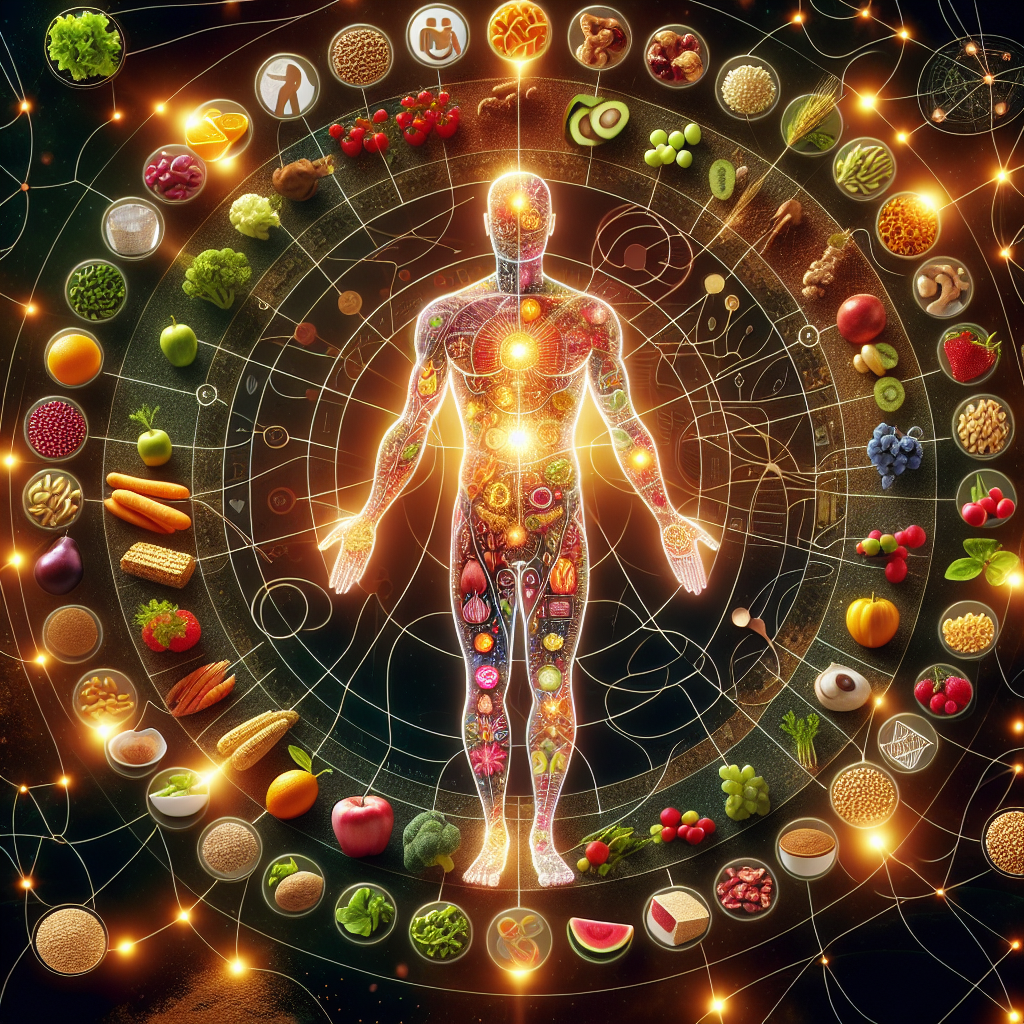Holistic Health Through Human Design and Nutrition

Discover the power of holistic health through human design and nutrition. Embrace a healthier, more vibrant lifestyle today. Start your journey here.
Exploring the Connection Between Human Design and Holistic Health
Holistic health is a comprehensive approach to wellness that considers the whole person — body, mind, spirit, and emotions — in the quest for optimal health and wellness. It is a lifestyle approach that goes beyond merely eliminating symptoms and seeks to help individuals achieve a higher level of wellbeing. One of the ways to achieve this is through understanding our unique human design and aligning it with proper nutrition.
Human Design is a system that combines elements of astrology, the I Ching, Kabbalah, Hindu-Brahmin chakra model, and quantum physics to provide a unique and specific ‘design’ of how an individual is energetically designed to interact with the world. It offers profound insights into our psychology, along with strategies and techniques for making decisions that align with our true selves.
The connection between Human Design and holistic health lies in the understanding that each of us is unique, and therefore, our paths to optimal health are also unique. This concept is not new; it is the foundation of personalized medicine and nutrition. However, Human Design takes it a step further by providing a detailed map of our energetic blueprint, which can guide us in making choices that are in alignment with our true nature, including choices about what we eat.
Nutrition plays a critical role in holistic health. The food we consume can either support our health or contribute to disease. However, with so many conflicting dietary theories, it can be challenging to know what is truly healthy. This is where Human Design can provide valuable guidance. According to Human Design, each of us has a unique digestive profile that determines what foods are best for us and how we should eat them. By following our unique dietary regimen, we can optimize our health and vitality.
For instance, some people are designed to eat in a calm environment, while others need stimulation while eating. Some people thrive on a vegetarian diet, while others need animal protein for optimal health. Some people need to eat small, frequent meals, while others do best with fewer, larger meals. By understanding and following our unique dietary regimen, we can support our digestive system and overall health.
Moreover, Human Design can also provide insights into other aspects of our health and wellbeing. It can reveal our unique way of processing emotions, which can guide us in managing stress and maintaining emotional balance. It can show us our natural strengths and talents, which can guide us in choosing a career or life path that is fulfilling and aligned with our true self. It can even reveal potential health challenges that we may be predisposed to, which can guide us in taking preventative measures.
In conclusion, the connection between Human Design and holistic health is a powerful one. By understanding our unique design, we can make lifestyle and dietary choices that are in alignment with who we truly are, leading to improved health, vitality, and overall wellbeing. It’s a personalized approach to health and wellness that respects our individuality and empowers us to take charge of our health. So, if you’re seeking a holistic approach to health, consider exploring your Human Design. It could be the key to unlocking your potential for optimal health and wellbeing.
Incorporating Nutrition into Your Human Design for Optimal Wellness

Holistic health is a comprehensive approach to wellness that considers the whole person, including physical, emotional, and spiritual well-being. One of the most innovative ways to achieve holistic health is through the integration of human design and nutrition. Human design is a system that combines astrology, the I Ching, Kabbalah, Hindu-Brahmin chakra model, and quantum physics to provide a unique and individualized blueprint of a person’s genetic makeup. This blueprint can guide individuals in making decisions that align with their true nature, leading to a more fulfilling and healthy life.
Incorporating nutrition into your human design is a powerful way to optimize your wellness. The foods we consume play a significant role in our overall health, affecting everything from our energy levels to our mood, cognitive function, and physical well-being. By understanding your human design, you can make more informed decisions about your diet, choosing foods that nourish your body and support your unique genetic makeup.
The first step in incorporating nutrition into your human design is understanding your type. There are four types in human design: Manifestors, Generators, Projectors, and Reflectors. Each type has a unique digestive profile, which can provide insights into the types of foods that are most beneficial for you. For instance, Manifestors may benefit from a high-protein diet to support their energy levels, while Generators might thrive on a balanced diet of proteins, carbohydrates, and fats. Projectors, on the other hand, may require a lighter diet with plenty of fresh fruits and vegetables, while Reflectors might benefit from a varied diet that changes with the lunar cycle.
Once you understand your type, you can begin to incorporate foods that align with your digestive profile. This doesn’t mean you need to follow a strict diet or eliminate certain foods entirely. Instead, it’s about making mindful choices that support your overall health and well-being. For example, if you’re a Generator, you might choose to incorporate more balanced meals into your diet, focusing on a mix of proteins, carbohydrates, and fats. If you’re a Projector, you might prioritize fresh fruits and vegetables, while Reflectors might choose to vary their diet based on the lunar cycle.
In addition to considering your type, it’s also important to listen to your body’s signals. Your body is incredibly wise and often knows what it needs to thrive. If you’re feeling sluggish or low on energy, it might be a sign that you need to adjust your diet. Similarly, if you’re feeling vibrant and full of energy, it’s likely a sign that your current diet is serving you well.
Incorporating nutrition into your human design is not about following a strict diet or adhering to rigid rules. Instead, it’s about understanding your unique genetic makeup and making dietary choices that support your overall health and well-being. By doing so, you can optimize your wellness, leading to a more fulfilling and healthy life.
In conclusion, the integration of human design and nutrition offers a powerful approach to holistic health. By understanding your unique genetic blueprint and making mindful dietary choices, you can optimize your wellness and live a life that aligns with your true nature. Whether you’re a Manifestor, Generator, Projector, or Reflector, there are dietary choices that can support your overall health and well-being. So why not take the first step towards holistic health by incorporating nutrition into your human design?
Understanding the Role of Human Design in Holistic Nutrition
Holistic health is a comprehensive approach to wellness that considers the whole person — body, mind, spirit, and emotions — in the quest for optimal health and wellness. It is a lifestyle approach that goes beyond the treatment of individual symptoms, focusing instead on the overall health of an individual. One of the key components of holistic health is nutrition, which plays a vital role in maintaining and improving our health. However, the concept of nutrition in holistic health goes beyond just eating a balanced diet. It also involves understanding our unique human design and how it influences our nutritional needs.
Human design is a system that combines astrology, the I Ching, Kabbalah, Hindu-Brahma chakra model, and quantum physics to provide a unique and individualized blueprint of our nature and potential. It offers profound insights into our psychology, including our talents, strengths, and vulnerabilities. More importantly, it provides a guide on how we can live in alignment with who we truly are.
In the context of holistic nutrition, human design can help us understand our unique dietary needs and how we can best nourish our bodies. Each of us has a unique human design, which means that what works for one person may not necessarily work for another. This is why some diets or nutritional plans may work wonders for some people but not for others.
For instance, according to human design, some people are designed to eat when they feel emotionally balanced, while others need to eat in a calm environment. Some people are designed to have a varied diet, while others thrive on a more consistent diet. Understanding these nuances can help us make more informed decisions about our diet and nutrition, leading to improved health and well-being.
Moreover, human design also provides insights into our digestive system and metabolism. For example, some people have a fast metabolism and need to eat small meals frequently, while others have a slow metabolism and do better with fewer, larger meals. Understanding our unique metabolic design can help us optimize our diet for better digestion and absorption of nutrients.
In addition to guiding our dietary choices, human design can also help us understand our relationship with food. For some people, food is a source of comfort and emotional support, while for others, it’s simply fuel for the body. By understanding our unique relationship with food, we can develop healthier eating habits and attitudes towards food.
In conclusion, human design offers a unique and personalized approach to holistic nutrition. It provides valuable insights into our unique dietary needs, digestive system, metabolism, and relationship with food. By understanding and aligning with our unique human design, we can make more informed dietary choices, leading to improved health and well-being.
However, it’s important to remember that human design is just one piece of the puzzle. Holistic health involves a comprehensive approach that considers all aspects of our health, including physical, mental, emotional, and spiritual health. Therefore, while human design can guide our nutritional choices, it’s also important to consider other aspects of our health, such as exercise, stress management, and emotional well-being.
In the end, holistic health through human design and nutrition is about living in alignment with who we truly are. It’s about making choices that support our overall health and well-being, leading to a more balanced and fulfilling life.